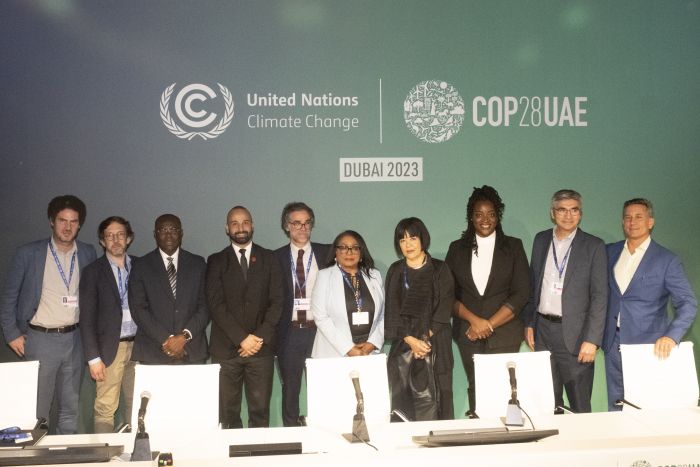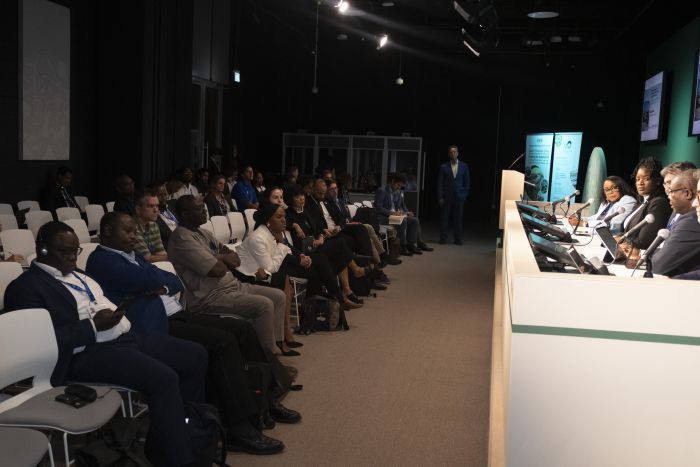On 10 December 2023 in the evening, the OACPS Secretariat, in partnership with 5 organizations working to support climate vulnerable countries and territories FERDI, Green Overseas Programme (GO Programme), OACPS, OCTA and UKOTA. have joined forces to organize a high-Level side-event in COP28 in Dubai: under the theme, The Role of the Multidimensional Vulnerability Index (MVI) in Leveraging Finance for Resilience Building. Its objective was to expressed concern about the exclusion of many Small Island Developing States (SIDS) from concessional financial resources* on the basis of their status as middle and high-income countries and the persistent use of per capita GNI (Gross National Income) as a criterion for determining access eligibility.” and called for the the use of a vulnerability index as a criterion to be used for accessing finance. It also aimed to helping identify additional significant private and public funding opportunities, to support the SIDS in mainstreaming of climate resilience in the implementation of NDC and NAP.

In the opening remarks Ms. Cristelle Pratt, Assistant Secretary General of the OACPs highlighted the need of taking vulnerability into account to better target the countries and territories most at risk from climate shocks. She informed the audience that UN GA has endorsed the OACPS’ submission of the OACPS Multidimensional Vulnerability Index (OMVI) and OACPS Multidimensional Resilience Index (OMRI). It is now highly recognized that the predominant and conventional manner of identifying countries and territories most vulnerable to climate change has long lacked adequate precision and overlooked many which truly warrant and require support. The OMVI is now an effective tool for an informed decision to concessional finance.
A first panel discussion, consisting of Dr. El Khalil Cherif, Senior Researcher at the Marine, Environment and Technology Center (MARTEC), and Dr. Matthieu Boussichas, Programme Officer at Ferdi and researcher in development economics, the focus was on the science related to the threats and challenges which vulnerable countries and territories face, and how to more effectively measure Vulnerability to better allocate limited financial resources to those who need it most. Pointed questions from the moderator and assembled public were followed.

A second panel, had consisted of high-level representatives of islands and territories. Hon. Josephine Connolly, Minister of Tourism, Environment, Fisheries and Marine Affairs, Culture and Heritage, Agriculture, and Religious Affairs, for the Government of Turks & Caicos, and Hon. Quincia Gumbs-Marie, Minister for Sustainability, Innovation and the Environment, for the Government of Anguilla, they provided, first hand testimonials about the real -on the ground - impacts of climate change, and shared their views on the urgent need for climate change resilience related efforts, whilst highlighting the financial gap which prevents many vulnerable countries and territories from accessing requisite CC related financial support.
A third panel debate consisted of representatives from international development finance institutions that in turn shared their views on how to practically close this financial gap in the (near and long-term) future in order to effectively address the direst impacts of climate change that habitually endanger the lives, livelihoods, health and well-being of local populations.
At the closing remarks, Mr. Nicolas Chenet, Director of the Sustainable Development Department at Expertise France, highlighted the urgency time that has come to acknowledge the plight of vulnerable countries & territories, and “Ensuring financial aid to fortify the resilience of vulnerable countries & territories is essential – and this will help safeguard the well-being of present & future populations on the front lines of climate change.”

